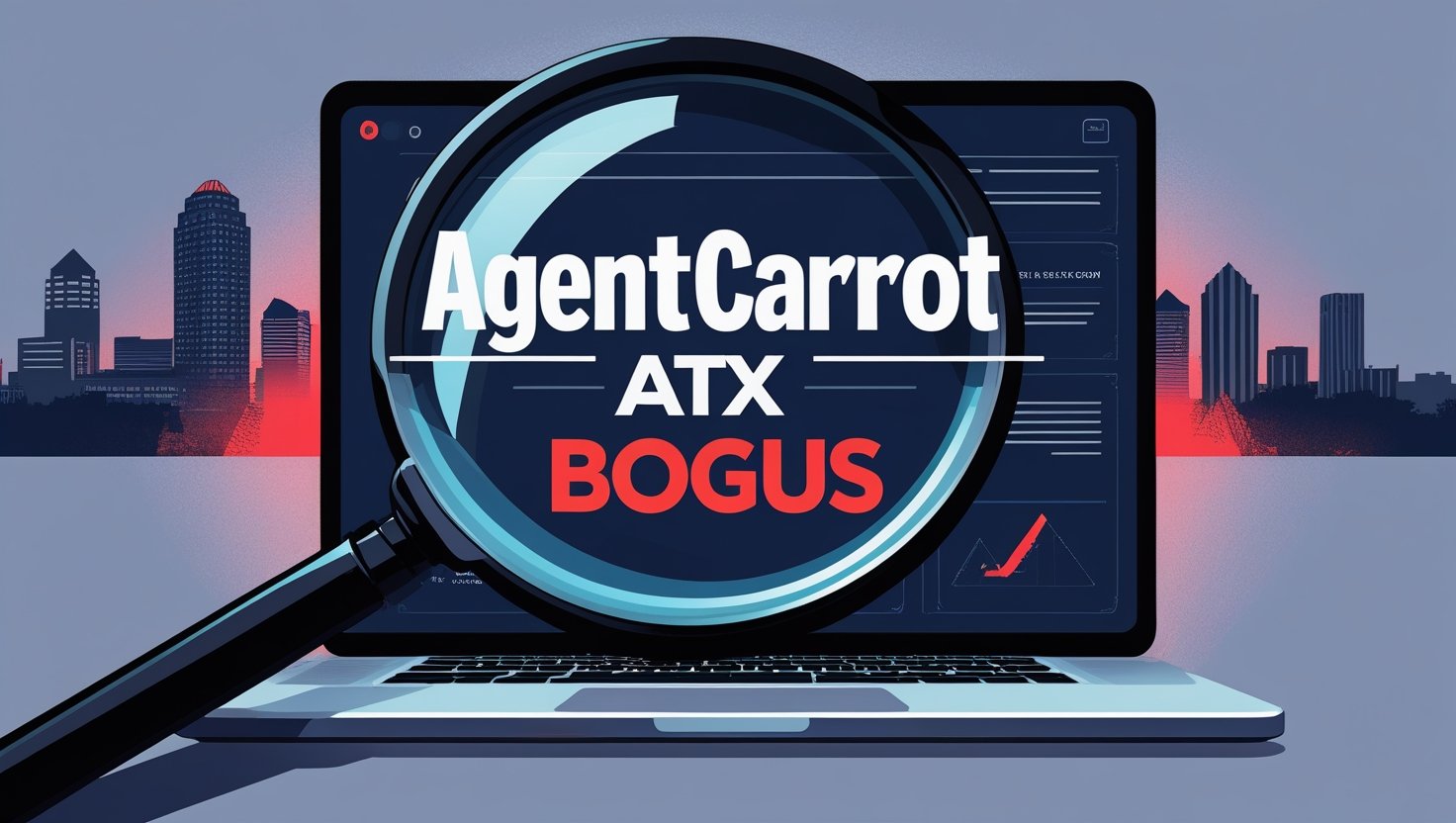AgentCarrot ATX Bogus In today’s fast-paced digital landscape, countless platforms emerge promising to revolutionize how businesses operate. Some claim to generate leads more efficiently, others boast about boosting sales, and a few even promise complete automation of marketing efforts. One such name that surfaced in this competitive market is AgentCarrot ATX. At first glance, the platform appeared innovative and filled with potential. However, over time, it became synonymous with the term “bogus”, raising concerns about its legitimacy and credibility.
The rise of bogus claims surrounding AgentCarrot ATX reflects a larger issue in the digital world—companies that overpromise but underdeliver. As entrepreneurs, small businesses, and freelancers search for affordable yet effective tools, platforms like AgentCarrot ATX often lure them with appealing marketing strategies. Unfortunately, many users who bought into the hype reported disappointing experiences. From technical glitches to questionable business practices, the platform quickly fell under scrutiny.
This article takes a deep dive into the AgentCarrot ATX controversy. We’ll explore what the platform claimed to be, the red flags that alarmed users, the rise of bogus allegations, and the consequences for businesses who trusted it. By the end, you’ll have a clear understanding of why the “bogus” label stuck and what lessons this case holds for anyone navigating today’s digital marketplace.
Understanding AgentCarrot ATX
What is AgentCarrot?
AgentCarrot was introduced as a digital solution for small businesses and real estate professionals. Its goal was to provide marketing automation, lead generation tools, and website-building capabilities under one roof. For business owners struggling to juggle multiple platforms, this promise seemed both attractive and cost-effective. The branding suggested innovation, simplicity, and a focus on helping users achieve quick success.
On paper, AgentCarrot appeared to compete directly with established platforms like Carrot.com, HubSpot, or Leadpages. The selling point was affordability combined with functionality. The company claimed it could offer all the features competitors provided but at a fraction of the cost. This naturally appealed to startups and entrepreneurs working with limited budgets.
However, beneath these promises lay problems. Users soon discovered that while the platform looked polished, its performance and customer experience did not align with expectations. Features that were advertised as robust often felt unfinished, and the platform’s reliability came into question. For many, AgentCarrot became an example of why flashy marketing should never replace proven value.
The ATX Connection
The inclusion of “ATX” in the name added an air of sophistication and credibility. Many assumed it linked the platform to Austin, Texas—a city known as a thriving hub for technology and startups. Leveraging such an association may have been a deliberate move to boost trustworthiness. The implication was clear: a tech-forward service with roots in one of America’s fastest-growing innovation hubs.
However, this connection also created skepticism once users began raising concerns. If the platform was truly tied to Austin’s tech scene, why were there so many complaints? Why didn’t it live up to the standards expected of companies from that ecosystem? Instead of strengthening the brand, “ATX” soon became a hollow addition, overshadowed by the growing chorus labeling the platform as “bogus.”
Rise of the Bogus Claims
Where the Allegations Started
The first whispers of AgentCarrot ATX being bogus began on consumer review platforms and business discussion forums. Disappointed users began sharing negative experiences—tools that didn’t function, unresponsive customer support, and misleading promotional materials. As these reviews accumulated, more users came forward with similar complaints.
Forums such as Reddit and niche Facebook groups became hubs for these discussions. Entrepreneurs compared notes, realizing that their struggles with AgentCarrot ATX were not isolated. Slowly but surely, the narrative of the platform being unreliable gained momentum. This collective sharing of experiences formed the foundation of the “bogus” label.
For a business in the digital era, where reputation is everything, such accusations spread like wildfire. What might have started as a few disgruntled customers quickly evolved into a broader movement questioning the platform’s authenticity. Once the word “bogus” took hold, it became nearly impossible for AgentCarrot ATX to shake it off.
Public Perception and Spread
Social media amplified the narrative at unprecedented speed. Platforms like Twitter, Instagram, and TikTok gave dissatisfied users the ability to voice frustrations to a global audience. Hashtags labeling AgentCarrot ATX as “bogus” gained traction, further damaging its image. Even individuals who had never used the service began associating it with negativity simply due to widespread online sentiment.
Perception in the digital age often outweighs reality. Once enough people repeated the same accusations, they took on a life of their own. For prospective users searching for reviews, the first results were overwhelmingly negative, further dissuading them from signing up. The viral spread of dissatisfaction is a stark reminder of how fragile reputations can be in a hyperconnected world.
Examining the Business Model
Promises Made by AgentCarrot ATX
At its core, AgentCarrot ATX positioned itself as a cost-effective, all-in-one digital solution. Its promises included user-friendly website templates, seamless lead tracking, automated email campaigns, and integrated analytics dashboards. Marketing materials emphasized ease of use, suggesting that even individuals with little to no technical background could see professional results.
The appeal was strong: why juggle multiple expensive platforms when one affordable service could handle everything? For small businesses, this was a dream proposition. Add to that aggressive marketing slogans like “guaranteed results” and “industry-leading tools,” and it’s easy to see why many were tempted.
Unfortunately, bold promises often backfire. While the service may have had good intentions, the delivery failed to match the pitch. For users expecting world-class performance, the gap between marketing and reality became a source of frustration and betrayal.
Reality Check
Once users began testing the platform, the problems became clear. Tools were glitchy, analytics were inaccurate, and automation features often malfunctioned. Instead of saving time and money, many found themselves spending additional hours troubleshooting issues. Some even reported abandoning projects altogether because the tools simply didn’t work as intended.
The reality check was sobering. For many, AgentCarrot ATX turned from a hopeful investment into a costly mistake. The disappointment fueled skepticism, and soon, even those considering the platform approached it with caution.
Red Flags and Warning Signs
Misleading Marketing Practices
One of the most glaring issues with AgentCarrot ATX was its reliance on misleading marketing tactics. Advertisements boasted guaranteed success, implying that businesses would achieve quick and measurable results. Such claims are almost always red flags, as no platform can truly guarantee outcomes in a competitive marketplace.
Moreover, the platform frequently compared itself to industry leaders, suggesting parity in quality and performance. This created inflated expectations that inevitably led to dissatisfaction. The reliance on hype over substance painted a picture of a company more interested in quick sales than long-term customer satisfaction.
Fake Testimonials and Reviews
Another troubling aspect was the flood of suspiciously positive reviews. Many followed a formulaic pattern, raising questions about their authenticity. Experienced consumers quickly recognized the signs of fabricated testimonials, such as identical phrasing and overly enthusiastic language.
Fake reviews damage trust significantly. Once users realized the testimonials weren’t authentic, it undermined the company’s entire reputation. Instead of attracting new customers, these tactics pushed potential buyers away.
Unclear Pricing Structures
Pricing transparency is vital in building customer trust. Unfortunately, AgentCarrot ATX failed in this area. While it advertised affordable rates, many users reported encountering hidden fees, limited functionality in the base package, and surprise charges for features that should have been standard.
For businesses operating on tight budgets, these unexpected costs created frustration and resentment. Unclear pricing not only eroded trust but also reinforced the perception that the platform was more focused on profit than providing genuine value.
User Experiences and Complaints
Common Complaints from Users
A recurring theme in user reviews was the lack of reliable customer support. Many reported sending multiple emails or opening support tickets, only to be met with silence or generic responses. Without proper assistance, even minor issues became major roadblocks.
Technical shortcomings also dominated complaints. Features often didn’t function as advertised, leaving businesses unable to execute marketing campaigns effectively. For some, these problems directly translated into lost opportunities and declining customer confidence.
Case Studies
Take, for instance, a real estate professional who invested in AgentCarrot ATX to generate leads. Despite weeks of effort, the leads produced were either irrelevant or of poor quality. Another entrepreneur described the frustration of trying to build a website through the platform, only to abandon the process due to endless glitches.
These case studies highlight the emotional and financial toll of trusting a platform that fails to deliver. Beyond wasted money, the loss of time and confidence added to the disappointment, making many feel deceived.
Investigating Legitimacy
Is AgentCarrot ATX a Scam or Just Mismanaged?
The central debate around AgentCarrot ATX is whether it is an outright scam or simply a poorly managed business. Some argue that the intent was not fraudulent, but rather the execution fell far short of promises. Others point to fake reviews and misleading ads as clear evidence of deception.
Both viewpoints carry weight. While it may not fit the definition of a traditional scam, the unethical practices used in marketing and customer engagement blur the lines.
Legal Concerns
As of now, no major lawsuits against AgentCarrot ATX have made headlines. However, consumer complaint platforms consistently feature it as a company to approach with caution. The lack of legal action does not absolve it but suggests that the problem lies more in poor quality than outright fraud.
Industry Expert Opinions
Experts in digital marketing emphasize that platforms like AgentCarrot ATX serve as cautionary tales. They highlight the importance of evaluating a company’s track record, customer service quality, and product reliability before making commitments. In their view, AgentCarrot ATX was more a case of overpromising and underdelivering than outright criminal activity.
Comparing Alternatives
Legitimate Competitors in the Market
Reliable competitors exist in abundance. Platforms like HubSpot, Squarespace, and Wix offer robust marketing and website-building tools with proven results. Though often pricier, these platforms provide transparency, reliable support, and continuous updates.
Specialized tools like Mailchimp for email marketing or Leadpages for landing pages also provide focused, trustworthy alternatives. Unlike AgentCarrot ATX, these companies have established reputations built over years of consistent service.
Why People Still Choose AgentCarrot ATX
Despite its flaws, AgentCarrot ATX still attracted users. Affordability was the biggest factor, especially for small businesses hoping to minimize expenses. Clever marketing also played a role, convincing people that they could achieve premium results at a budget price.
Unfortunately, many realized too late that low cost does not equal high value. The short-term savings often turned into long-term setbacks.
Consequences of Falling for Bogus Platforms
Financial Losses
The most obvious consequence is financial. Subscription fees, hidden costs, and wasted ad spend quickly add up. For startups, even small losses can have devastating effects on long-term growth and sustainability.
Reputation Damage
A business’s reputation is tied closely to the tools it uses. When websites malfunction or campaigns fail, customers rarely blame the platform—they blame the business. For many, relying on AgentCarrot ATX damaged credibility and trust with their clients.
Wasted Time and Effort
Time is the one resource that cannot be replaced. Many users invested weeks or months setting up campaigns, only to realize the tools didn’t deliver. This wasted effort could have been redirected to proven strategies with far better outcomes.
How to Protect Yourself from Bogus Services
Research Before You Buy
Due diligence is essential. Before investing in any platform, read reviews from multiple independent sources, research the company’s background, and check for third-party endorsements.
Spotting Red Flags Early
Be wary of platforms that make absolute guarantees, rely heavily on testimonials without verifiable case studies, or present unclear pricing structures. These are common indicators of unreliable services.
Relying on Trusted Platforms
Choosing trusted, well-established platforms is often worth the investment. While they may cost more upfront, the reliability, support, and long-term results far outweigh the risks of experimenting with questionable alternatives.
The Future of AgentCarrot ATX
Can It Redeem Itself?
Redemption is not impossible. With transparent pricing, genuine marketing, and improved customer service, AgentCarrot ATX could rebuild trust. However, this requires a cultural shift within the company and a genuine commitment to user satisfaction.
Predictions for Its Market Presence
Without major reforms, the future of AgentCarrot ATX appears bleak. In a competitive market filled with reliable alternatives, its tarnished reputation may lead to eventual obscurity. Consumers are unlikely to give it a second chance unless significant improvements are made.
Broader Lessons from the AgentCarrot ATX Case
Why Consumers Need to Stay Vigilant
AgentCarrot ATX serves as a reminder that consumers must remain cautious in the digital marketplace. Skepticism is healthy, and businesses should never accept marketing claims at face value without thorough research.
Impact on the Tech and Marketing Industry
Bogus platforms damage not only themselves but also the broader industry. They erode consumer trust, making it harder for legitimate companies to build relationships. This highlights the importance of ethical practices and transparency in sustaining the digital economy.
Conclusion
AgentCarrot ATX is a case study in how overpromising and underdelivering can quickly destroy a brand’s reputation. While not necessarily a criminal scam, its misleading marketing, fake reviews, and poor product performance justify the “bogus” label many users attached to it.
For entrepreneurs and businesses, the lesson is clear: do not be swayed solely by affordability or flashy claims. Instead, invest in platforms with proven reliability and transparency. In a world filled with digital promises, trust and credibility remain the most valuable assets.
FAQs
1. What is AgentCarrot ATX and why is it called bogus?
AgentCarrot ATX is a digital platform marketed for marketing automation and website tools. It gained the label “bogus” due to misleading promises, poor performance, and user dissatisfaction.
2. How can I tell if a digital platform is fraudulent?
Red flags include exaggerated guarantees, fake-looking reviews, hidden fees, and vague explanations of features.
3. Are there legal cases against AgentCarrot ATX?
Currently, no major lawsuits have been reported. However, numerous consumer complaints have flagged it as unreliable.
4. What are the safest alternatives to AgentCarrot ATX?
Trusted alternatives include HubSpot, Wix, Squarespace, Leadpages, and Mailchimp, all of which have strong reputations.
5. How can users protect themselves from fake reviews and misleading ads?
Always cross-check reviews on independent platforms, verify testimonials, and research company history before purchasing.
Read more Halloweentocht 2024










